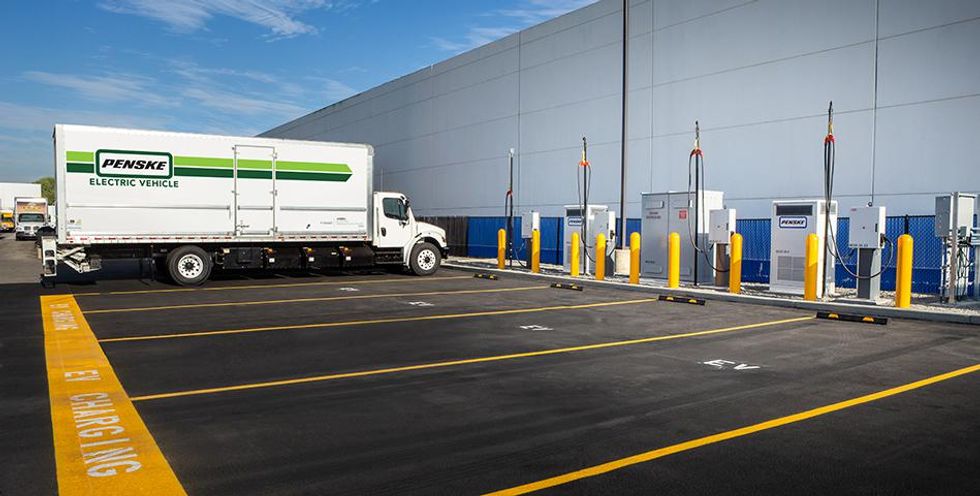“It is an exceptionally dynamic and exciting moment in time, with such an extraordinary array of advanced technologies and clean fuels available in the marketplace,” said Erik Neandross, president of GNA (now part of TRC) and the producers of ACT Expo, an industry conference dedicated to advanced clean transportation.
When introducing the 2023 State of Sustainable Fleets report, Neandross said 2027 could be the last of the major diesel engine development programs. The 2024 State of Sustainable Fleets report will be released during ACT Expo, May 20-23, at the Las Vegas Convention Center. Penske Truck Leasing executives, including Art Vallely, president, Scott Brower, vice president of vehicle supply, and Josh Grodin, vice president of government affairs, will present during the expo.
Catalysts for Change
Regulatory requirements are one of several factors pushing OEMs and fleets to more sustainable options. Federal and state policymakers have released new laws and legislation mandating zero-emission vehicles and associated infrastructure deployments.
The Environmental Protection Agency recently finalized its Phase 3 emissions standards for heavy-duty trucks, buses and other large vehicles for model years 2027 through 2032. The standards, which were published on March 29, do not rule out internal combustion engines but will put more pressure on fleets to adopt zero-emission technologies and look to current and developing clean vehicle technologies to further reduce emissions throughout the industry.
However, fleets aren’t waiting for government mandates to invest in technologies.
Technology Available Today
While speaking at ACT Expo 2023, Drew Cullen, senior vice president of fuels and facility services at Penske Transportation Solutions, said there are solutions in use today that can help fleets reduce their carbon footprint, and fleets are trying to do the right thing outside of regulatory pressure. “We’re all trying to get workable solutions that we can fit into our business to make a difference,” he explained.
Penske Truck Leasing has been operating, supporting and maintaining alternative-fueled vehicle fleets for more than 30 years, including commercial electric vehicles for a decade, and can help fleets navigate the transition to advanced vehicle technologies and fuels. These include:
Battery-Electric Vehicles: Battery-electric vehicles work well in certain applications, and there are several paths fleets can pursue as they adopt the technology. EV Class 8 trucks often get a lot of attention, but the logical place for many fleets to start is light- and medium-duty equipment. They typically travel shorter distances than heavy-duty equipment, which enables them to finish their routes on one charge, return to their base and recharge overnight.
Currently, the Penske Truck Leasing EV Evaluation Fleet includes vehicles such as the Freightliner eCascadia (Class 8), Freightliner eM2 (Class 6 and 7), Volvo VNR electric tractor (Class 8), International® eMV™ (Class 6 and 7), Ford E-Transit (Class 2), Orange EV e-Triever electric terminal truck (Class 8 yard tractor), Freightliner Custom Chassis MT50e walk-in (Class 5 and 6), and XOS walk-in (Class 6).
Natural Gas: Natural gas can help reduce total greenhouse gas emissions, and a new report from the North American Council for Freight Efficiency found renewed interest in using natural gas in transportation because it is a lower-carbon fuel than diesel and cleaner-burning. According to the report, Natural Gas’ Role in Decarbonizing Trucking, around 70% of natural gas used in transportation is renewable natural gas.
Condensed natural gas (CNG) works well for fleets with specific and dedicated routes that are predictable and repeatable. It also works well within specific mileage ranges. Penske Truck Leasing has experience with natural gas vehicles for full-service truck leasing and commercial truck rental customers, and works with fleets to identify use cases where the fuel makes sense.
Renewable Diesel Fuel: Renewable diesel (RD) has proven to be a sustainable drop-in fuel that can replace diesel. It is refined just like regular fossil petroleum but comes from refining plant-based oils up to R-99. According to the State of Sustainable Fleets 2023 report, both the production and use of the fuel have grown.
Renewable diesel significantly reduces emissions compared to fossil-fuel-based diesel, cutting particulate matter by more than 40%, carbon monoxide by more than 25%, total hydrocarbons by more than 20%, NOx by 10%, and lifecycle GHG emissions by up to 90%. There are also performance benefits due to higher cetane, lower aromatics for improved public health, and excellent cloud point for cold-weather use. Penske currently offers R-99 — 99% renewable diesel fuel — at multiple locations on the West Coast.
The 2024 State of Sustainable Fleets report will provide the latest figures on growth in these solutions as well as hydrogen fuel cells, propane and more.
Learn More
Contact Penske Truck Leasing to learn more about sustainable solutions that might work well in your applications.

